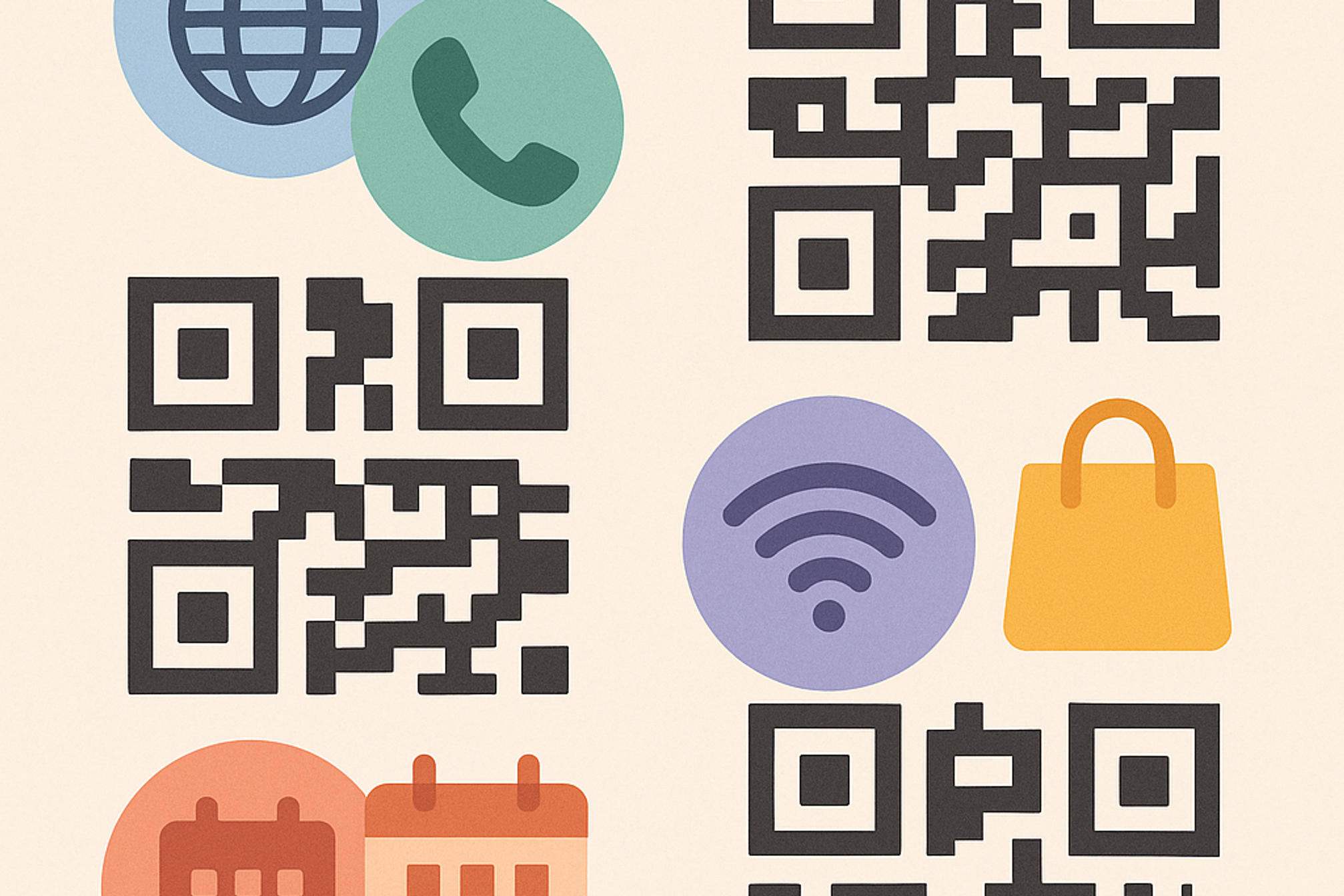Monday, May 5, 2025
Different Types of QR Codes: Definition and Use Cases

QR codes have rapidly evolved from simple shortcuts to digital information into versatile tools for marketing, payments, inventory management, and beyond. For business owners and marketing managers, understanding the different types of QR codes and their best use cases is essential for effective and innovative communication.
In this article, we'll explore the various types of QR codes, their unique functionalities, and how they can benefit your business. Let's dive in!
What Is a QR Code?
A QR code (Quick Response code) is a two dimensional barcode that stores information accessible by scanning with a smartphone or QR reader. Originally developed in the automotive industry, QR codes are now ubiquitous in marketing, sales, and customer engagement strategies.
Types of QR Codes
QR codes come in different forms, each serving specific purposes. Below, we'll break down the most common types and their ideal use cases.
1. Static QR Codes
Static QR codes encode fixed data that cannot be altered once generated. They are simple, straightforward, and useful for permanent information.
Use cases:
- Website URLs
- Contact information (vCards)
- Wi-Fi passwords
- Product packaging
Advantages:
- Ideal for permanent information
Limitations:
- Data can't be edited
- No tracking capability
2. Dynamic QR Codes
Dynamic QR codes store a short URL that redirects users to the target information, which can be changed anytime without altering the code itself.
Use cases:
- Marketing campaigns
- Menus and price lists
- Event details
- Coupons and promotional offers
Advantages:
- Information can be updated anytime
- Real time tracking and analytics
- Enhanced customer engagement
Limitations:
- Usually requires a subscription
3. URL QR Codes
URL QR codes redirect users to a specific webpage, making online navigation seamless.
Use cases:
- Promotional landing pages
- Online stores
- Product information pages
Advantages:
- Easy to implement
- Drive web traffic efficiently
4. vCard QR Codes
These QR codes allow you to store contact information digitally.
Use cases:
- Business cards
- Networking events
- Corporate contacts
Advantages:
- Quick digital contact exchange
- Eco friendly alternative to printed cards
5. Wi-Fi QR Codes
Wi-Fi QR codes simplify network access without typing passwords manually.
Use cases:
- Restaurants and cafes
- Hotels and event venues
- Co-working spaces
Advantages:
- Enhanced customer convenience
- Improved visitor experience
6. File QR Codes
These QR codes provide instant access to downloadable files.
Use cases:
- Product manuals
- Event brochures
- Detailed marketing materials
Advantages:
- Easy distribution of digital content
- Reduction of print costs
7. Social Media QR Codes
Direct users instantly to social media profiles or posts.
Use cases:
- Increasing social media followers
- Running social media campaigns
- Event promotions
Advantages:
- Boost social media engagement
- Simplify user interaction
Choosing Between Static and Dynamic QR Codes
Understanding the difference between static and dynamic QR codes is crucial for selecting the right solution for your business.
Static QR Codes
Static codes are excellent for information that doesn't change, such as contact details or Wi-Fi passwords. Once created, the data remains fixed.
Dynamic QR Codes
Dynamic codes offer versatility. You can update the destination URL, making them perfect for:
- Seasonal promotions
- Real-time offers
- Flexible marketing campaigns
Additionally, dynamic QR codes provide valuable analytics, tracking metrics like:
- Number of scans
- Device type
- Location
- Scan frequency
These insights help businesses refine marketing strategies and understand customer behavior better.
RealWorld Examples of QR Codes in Action
Here are some practical examples demonstrating QR code effectiveness:
- Restaurants: Dynamic QR codes for menus allow quick updates, highlighting daily specials or adjusting prices.
- Retail: QR codes on packaging that redirect customers to tutorials or related products, enhancing user experience.
- Events: QR codes on tickets providing instant access to event schedules, maps, or safety guidelines.
Tips for Effective QR Code Implementation
Maximize your QR code usage by following these best practices:
- Ensure Visibility: Place QR codes where they're easily seen and scanned.
- Test Regularly: Verify QR codes regularly to ensure links and content remain active.
- Optimize Landing Pages: Provide a mobile friendly experience for users scanning your QR codes.
- Provide Clear Instructions: Briefly inform users what to expect upon scanning to encourage higher engagement.
Why QR Kit Is Your Go To QR Code Generator
QR Kit is specifically designed for businesses and marketers seeking powerful yet user friendly QR code solutions. Here's why QR Kit stands out:
- Easy to Use: Intuitive interface makes QR code creation simple.
- Comprehensive Analytics: Track user interactions with detailed metrics.
- Highly Customizable: Personalize your QR codes to match your brand identity.
- Affordable Pricing: Suitable plans to accommodate businesses of any size.
- Dynamic Codes: Edit your QR content anytime without changing the physical code.
Understanding the different types of QR codes and their practical applications empowers your business to communicate effectively, engage customers, and boost your marketing efforts. QR Kit simplifies the process, giving you all the tools you need to create, manage, and analyze your QR codes.
Ready to experience the power of dynamic QR codes? Sign up with QR Kit today and create your first dynamic QR code for free! Start elevating your marketing strategy right away.



